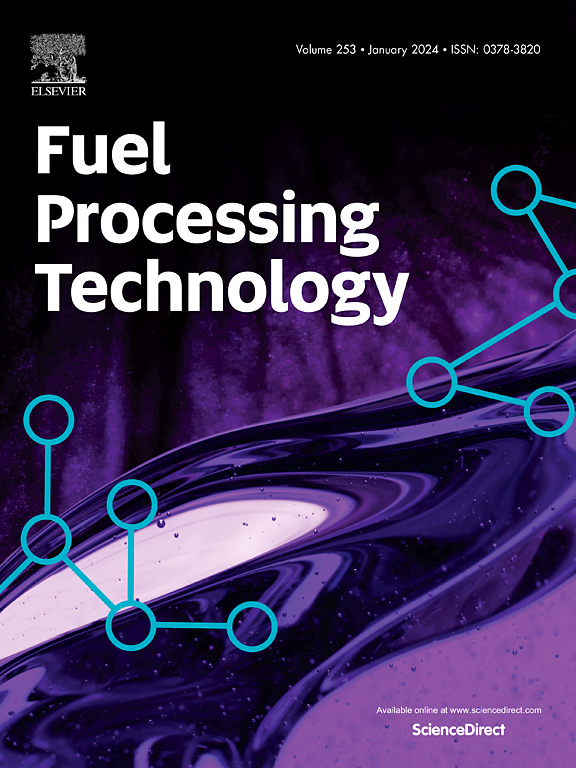利用离子液体催化剂在低温下加氢处理废塑料生产柴油
IF 7.7
2区 工程技术
Q1 CHEMISTRY, APPLIED
引用次数: 0
摘要
塑料因其耐用性、重量轻、成本效益和多功能性而在日常生活中发挥着不可或缺的作用,因此开发有效的废物管理解决方案对于解决合成塑料在其生命周期结束时处理所带来的挑战至关重要。塑料大多来自石油基原料,可以通过催化和水热技术再加工成石油产品。裂解油主要由不饱和烃组成,需要通过加氢加工升级为饱和芳香族化合物,用于汽车燃料应用。本文介绍了一种利用离子液体负载固体催化剂在低温下将废塑料加氢加工成燃料的创新方法。具体而言,以介孔Ni/SBA-15为载体,固定化1-乙基-3-甲基咪唑三酸酯(EMIM-OTf)为加氢催化剂。与以往需要高反应温度(300-400°C)和非均相催化剂的研究不同,我们的工艺在190°C和70 bar H2压力下将塑料热解油转化为柴油当量燃料。气相色谱-质谱分析证实了烯烃转化为石蜡和反应物芳构化,生成苯和萘衍生物。所得到的正石蜡和异石蜡分别与商业柴油匹配95%和90%,芳烃增加3.65%。加氢热解油(HMP-PO)的理化性能符合en590欧洲柴油标准。这项研究强调了低温战略,有助于提高能源效率和减少塑料废物。本文章由计算机程序翻译,如有差异,请以英文原文为准。
Hydroprocessing of waste plastics to produce diesel under low processing temperatures using ionic liquid catalyst
Plastics play an indispensable role in daily life due to their durability, light weight, cost-effectiveness, and versatility, making the development of efficient waste management solutions vital for addressing the challenges posed by synthetic plastic disposal at the end of their lifecycle. Plastics, mostly sourced from petroleum-based feedstocks, can be reprocessed into petroleum products by catalytic and hydrothermal techniques. Pyrolysis oil, which predominantly consists of unsaturated hydrocarbons, requires upgrading to saturated aromatic compounds through hydroprocessing for use in vehicle fuel applications. This work introduces an innovative method employing ionic liquid-supported solid catalysts for the hydroprocessing of waste plastics into fuel at low processing temperatures. Specifically, 1-ethyl-3-methylimidazolium triflate (EMIM-OTf) immobilized on mesoporous Ni/SBA-15 was used as a hydroprocessing catalyst. Unlike previous studies requiring high reaction temperatures (300–400 °C) with heterogeneous catalysts, our process converted plastic pyrolysis oil to diesel-equivalent fuel at 190 °C under 70 bar H2 pressure. GC–MS analysis confirmed olefin conversion into paraffins and the aromatization of reactants, yielding benzene and naphthalene derivatives. The resulting n-paraffins and isoparaffins matched commercial diesel by 95 % and 90 %, respectively, with a 3.65 % increase in aromatics. The physicochemical properties of the hydroprocessed pyrolysis oil (HMP-PO) complied with EN 590 European diesel standards. This study highlights a low-temperature strategy, contributing to energy efficiency and plastic waste mitigation.
求助全文
通过发布文献求助,成功后即可免费获取论文全文。
去求助
来源期刊

Fuel Processing Technology
工程技术-工程:化工
CiteScore
13.20
自引率
9.30%
发文量
398
审稿时长
26 days
期刊介绍:
Fuel Processing Technology (FPT) deals with the scientific and technological aspects of converting fossil and renewable resources to clean fuels, value-added chemicals, fuel-related advanced carbon materials and by-products. In addition to the traditional non-nuclear fossil fuels, biomass and wastes, papers on the integration of renewables such as solar and wind energy and energy storage into the fuel processing processes, as well as papers on the production and conversion of non-carbon-containing fuels such as hydrogen and ammonia, are also welcome. While chemical conversion is emphasized, papers on advanced physical conversion processes are also considered for publication in FPT. Papers on the fundamental aspects of fuel structure and properties will also be considered.
 求助内容:
求助内容: 应助结果提醒方式:
应助结果提醒方式:


